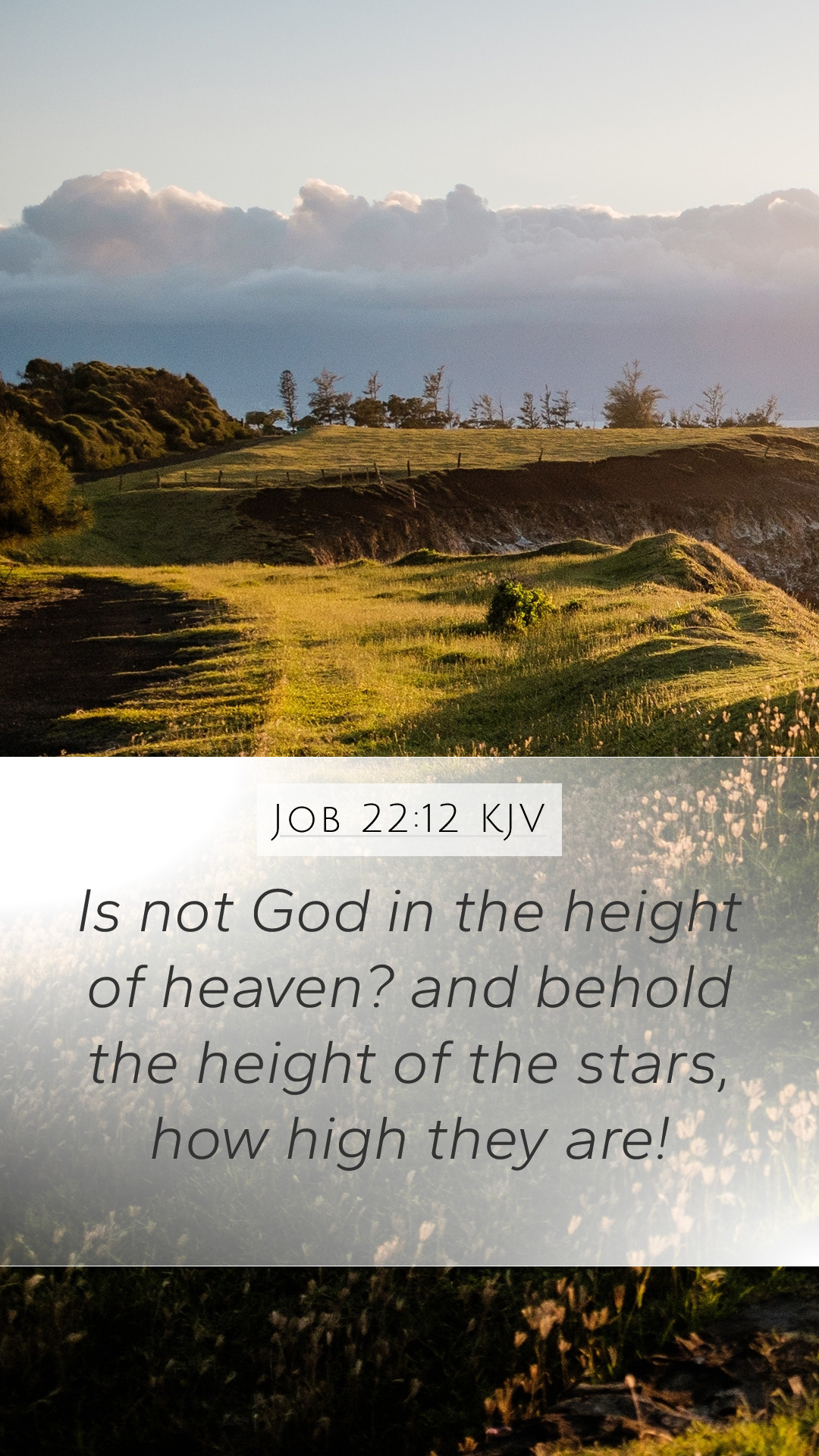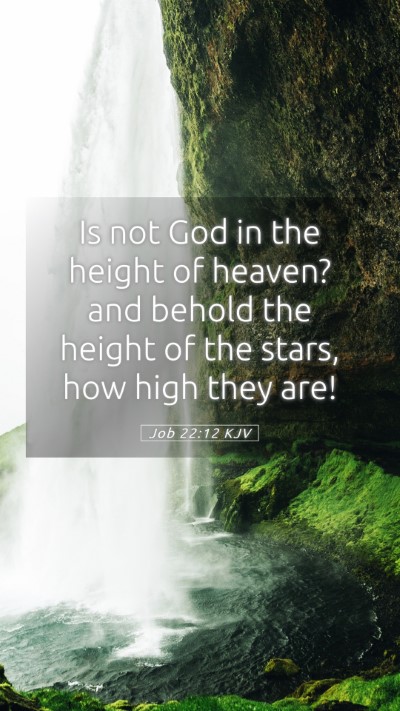Old Testament
Genesis Exodus Leviticus Numbers Deuteronomy Joshua Judges Ruth 1 Samuel 2 Samuel 1 Kings 2 Kings 1 Chronicles 2 Chronicles Ezra Nehemiah Esther Job Psalms Proverbs Ecclesiastes Song of Solomon Isaiah Jeremiah Lamentations Ezekiel Daniel Hosea Joel Amos Obadiah Jonah Micah Nahum Habakkuk Zephaniah Haggai Zechariah MalachiJob 22:12 Meaning
What is the meaning of Job 22:12?
Is not God in the height of heaven? and behold the height of the stars, how high they are!
Job 22:12 Bible Verse Meaning
Understanding Job 22:12
Job 22:12 states, "Is not God in the height of heaven? And behold the height of the stars, how high they are!" This verse invites reflection on God's omnipotence and the grandeur of creation, particularly the vastness of the heavens.
In seeking to derive the bible verse meaning, we can look at the interpretations provided by renowned public domain commentators such as Matthew Henry, Albert Barnes, and Adam Clarke. Each offers unique insights into the complexities of this text, emphasizing the importance of both a literal and figurative understanding of God's nature and sovereignty.
Commentary Insights
-
Matthew Henry's Commentary:
Henry emphasizes the theme of divine transcendence. He illustrates that God is not confined by earthly limitations, allowing for a profound appreciation of God's greatness. The verse serves not just as a rhetorical question but as a bold declaration of God's power, urging believers to recognize their own limitations in understanding His majesty.
-
Albert Barnes' Commentary:
Barnes interprets this verse by focusing on the reassurance it brings to believers. He suggests that the height of heaven and stars signifies God's vast and immeasurable sovereignty. It acts as a reminder that no matter the tribulations faced on earth, God’s perspective is infinitely broader and more powerful.
-
Adam Clarke's Commentary:
Clarke provides a critical analysis of the verse in the wider context of Job’s dialogue. He suggests that this statement reflects a common belief of the time about God’s residence in the heavens, juxtaposed with humanity's earthly sufferings. Clarke’s interpretation centers on the disconnection between God's high ambitions for creation and the struggles that human beings often face.
Applying Job 22:12: Practical Insights
The verse encourages readers to engage in bible study not only for academic pursuit but also for spiritual edification. By recognizing the vastness of God, we can better appreciate His intimate involvement in our daily lives. Here are some bible study insights that can be drawn from Job 22:12:
- Divine Sovereignty: Understanding that God reigns supreme allows us to trust Him during difficult times.
- Perspective on Suffering: Realizing our smallness in the grand design of creation can provide comfort amidst personal trials.
- Approaching the Divine: This verse teaches humility when we approach God in prayer and worship.
Historical Context
Job's discourse occurs in a time of great personal loss and anguish for him. The verses surrounding Job 22:12 explore themes of questioning God's justice and the human condition's frailty. This cultural and historical context enhances our understanding of Scripture, shedding light on how concerns about divine fairness and human suffering have persisted throughout history.
Related Bible Verses
To enrich your study, consider these related scripture references that can provide additional context and deepen your bible verse interpretation:
- Psalm 8:3-4: "When I consider your heavens, the work of your fingers, the moon and the stars, which you have set in place, what is mankind that you are mindful of them?"
- Isaiah 55:9: "As the heavens are higher than the earth, so are my ways higher than your ways and my thoughts than your thoughts."
- Romans 11:33: "Oh, the depth of the riches of the wisdom and knowledge of God! How unsearchable his judgments, and his paths beyond tracing out!"
Conclusion
In conclusion, Job 22:12 serves as a profound reminder of God's omnipotence and the awe-inspiring nature of creation. It encourages believers to reflect not only on their personal faith journeys but also on the broader implications of God’s sovereignty. Through thoughtful bible study and comprehension of this verse, one can unlock deeper bible verse explanations and engage meaningfully with the text.
By integrating insights from historical, cultural, and theological perspectives, readers can approach difficult Bible passages with enhanced clarity, seeking not just to understand but to apply the profound wisdom found in Scripture to their lives.


